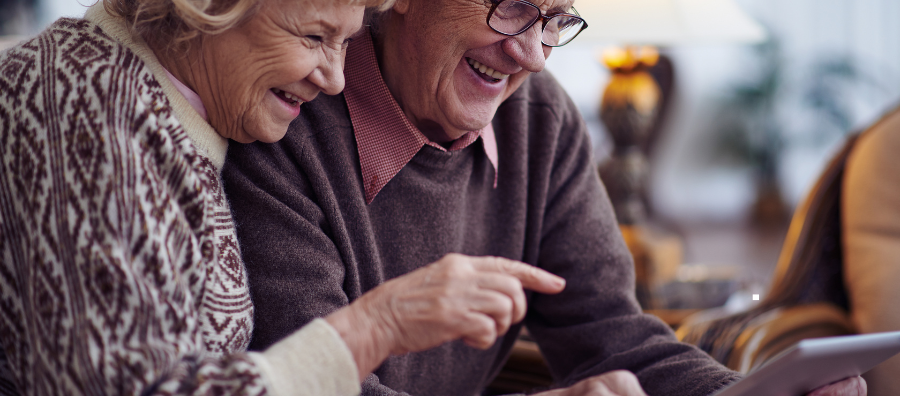Loneliness is one of the greatest challenges faced by older adults, especially those living with dementia. Beyond the emotional toll, isolation can lead to serious health issues including depression, anxiety, and even a faster decline in cognitive function. At Braeburn Care, we see first-hand how connection – whether through a carer’s friendly presence or the right use of technology – can transform someone’s day and hence focus on reducing isolation throughout the services we provide.
In 2025, new tools and innovations are making it easier than ever to bridge the gap between loved ones, reducing isolation at home. From video calling platforms to voice assistants and even AI-powered companionship tools, technology is becoming a valuable partner in dementia care.
Understanding the Impact of Isolation
Research consistently shows that loneliness has the same impact on health as smoking 15 cigarettes a day. For people living with dementia, isolation can also:
- Increase confusion and disorientation.
- Reduce appetite and interest in activities.
- Accelerate memory decline.
- Create higher risks of hospitalisation.
In Kent and East Sussex, where Braeburn Care supports many families, we hear time and again that one of the biggest concerns is: “How can I make sure Mum or Dad doesn’t feel alone between visits?”
This is where thoughtful use of technology makes a real difference.
Video Call Technology: Staying Connected Face-to-Face
Seeing a familiar face can lift mood instantly. Video calling tools like Zoom, FaceTime, and WhatsApp have become essential for families who want to stay close even when distance or mobility makes visits difficult.
For people living with dementia, video calls can:
- Offer reassurance by seeing loved ones “in person.”
- Support memory by reconnecting faces with voices.
- Provide regular contact, even if just for five minutes a day.
Carers can encourage customers to join simple, scheduled calls, helping them feel more engaged with family life. Some platforms even offer group video calls, allowing multiple family members to connect together.
Voice Assistants: Simple Prompts and Companionship
Smart devices like Amazon Alexa and Google Home are becoming household staples – and they’re particularly valuable in dementia care.
These devices can:
- Remind individuals to eat, drink, or take medication.
- Play favourite music or radio stations, which often spark positive memories.
- Answer simple questions (“What day is it?”) reducing frustration.
- Provide a sense of companionship when someone is alone.
Used alongside human care, voice assistants help create routines that are both safe and reassuring.
AI-Powered Companionship Tools
While the idea of a “robot companion” might sound futuristic, AI-powered tools are already being trialled to support wellbeing at home. Devices like ElliQ (an interactive robot for seniors) or simple tablet-based chat companions use artificial intelligence to engage in conversation, encourage activities, and reduce feelings of loneliness.
Of course, no machine can replace human empathy. But as part of a wider care plan, these tools can provide comfort during quiet moments and prompt positive daily habits.
Encouraging Safe Online Activities
Technology isn’t just about devices – it’s also about safe online engagement. Many people living with dementia can benefit from:
- Online reminiscence sessions using photos, music, and videos.
- Virtual community groups such as dementia cafés or exercise classes.
- Creative workshops delivered over Zoom, including art, music, or gentle movement.
At Braeburn Care, our carers often sit alongside customers, helping them log in safely and take part. With the right guidance, online spaces become a lifeline for social interaction.
The Human Side of Technology
It’s important to remember that technology is most effective when combined with compassionate, person-centred care. Devices can connect, remind, and prompt – but they cannot share a laugh, hold a hand, or offer reassurance in the way a carer can.
That’s why our approach is always tech plus human. We support families to integrate digital tools while ensuring that the heart of care remains face-to-face connection, respect, and understanding.
Local Support Across Kent & East Sussex
Families in Tunbridge Wells, Tonbridge, Sevenoaks, Crowborough, and surrounding towns often ask us how technology can complement live-in or visiting care. Our answer is always tailored: what works for one customer may not suit another.
By taking the time to know each customer – their preferences, confidence with technology, and specific needs – we create a balanced plan that combines hands-on support with safe, beneficial tech solutions.
Looking Ahead
The future of dementia care will see even more integration of AI and digital tools. From predictive health monitoring to virtual reality reminiscence therapy, the possibilities are growing. But one thing will never change: the need for compassion, dignity, and human connection.
Reducing isolation for people living with dementia is about more than simply “checking in.” It’s about ensuring they feel seen, heard, and valued. Technology, used thoughtfully, is helping us achieve this – from video calls that bring families closer to voice assistants that make the day run more smoothly.
At Braeburn Care, we’ll continue to explore innovative ways of reducing isolation, while keeping our focus on what matters most – people. With the right balance of innovation and empathy, mealtimes, routines, and connections become not just safer, but more joyful.
🌐 Find out more about how Braeburn Care supports dementia care at home by contacting our team today;
📞 Call us on 01892 577680
🌐 Learn more at www.braeburncare.co.uk
📩 Email enquiries@braeburncare.co.uk













